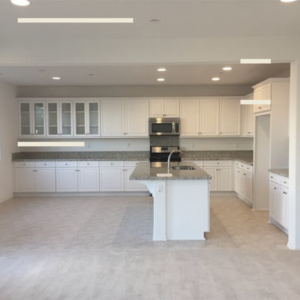When you’re considering buying a home, whether it’s your first house or your fifth, you’re contemplating putting down roots. You’re making a long-term commitment of both time and money. You want to make sure that the seeds you plant are in soil that’s fertile, a healthy place to secure the foundation of your lifestyle for at least the next several years, if not longer. So, you begin asking yourself a series of questions. If you already own a home and are considering upsizing, downsizing, or making a lateral move, you may wonder whether you should renovate vs. relocate, how you’ll fund the leap between multiple mortgages, and if you should buy a pre-existing home or brand-new construction. Only you can identify your reasons for moving and your needs in a property. However, you can research to discover which options are best for you. Here is your guide to buying a new home in Corona, California.
The Cost of Buying A New Home
 One thing to keep in mind from the beginning when considering new construction homes is that builders do not typically negotiate on price. When you submit a bid on a pre-owned house, you can offer an amount less than the asking price. The seller will accept the offer or negotiate a different monetary amount. Such is not the case with new construction home builders. On the contrary, with brand new houses, you begin with a starting price and work your way up.
One thing to keep in mind from the beginning when considering new construction homes is that builders do not typically negotiate on price. When you submit a bid on a pre-owned house, you can offer an amount less than the asking price. The seller will accept the offer or negotiate a different monetary amount. Such is not the case with new construction home builders. On the contrary, with brand new houses, you begin with a starting price and work your way up.
Tips for Negotiating Price
You may not be able to convince the builder to drop the price of the home by a percentage or dollar value, but that doesn’t mean you aren’t able to work a deal. Things that you can negotiate into the agreement are some of the upgrades and appliances. Builders operate with the philosophy that reducing the price of a home is to degrade the value of the work. However, including bonuses and add-ons conjures a different perception, so is a more favorable method of negotiations for builders.
Builders have goals, incentives, quotas, and numbers they try to hit, which means that at the end of the quarter, builders may be more motivated to sell homes based on the goals they need to meet for that quarter. For this reason, you may find more negotiating power for incentives and bonuses at the end of each quarter.
Understanding New Construction Pricing Models
Touring model homes, your eye may catch many of the trinkets and treasures the builders are hoping you’ll notice. That’s a stunning fireplace. Those touch-less sink faucets are amazing. The hardwood floors add such a luxurious element to the ambiance. None of those features come with the base model at the base price. They are upgrades.
As you move through touring model homes of new construction communities, each time you get tickled by eye-candy, stop and ask: is this standard with the house, or is this an upgrade? When the answer is an upgrade, start summing those numbers up in your mind and add them to the base price of the house. What may have seemed like a steal of a deal on a new home may evolve into a lavishly expensive house.
These upgrades – the high-end appliances, fine finishes, extra features – are the things you can use to negotiate with the builder in place of reducing the price of the home.
Can You Buy a New Home with an FHA Loan?
The FHA, Federal Housing Authority, has excellent loan programs available for home buyers who meet specific criteria. However, you might imagine it could be difficult to apply for special funding for a house that doesn’t yet exist. Funding homes that haven’t been built yet is a different process from traditional home mortgage loans. Conventional loans alone don’t cover new construction houses, so construction loans are implemented in some cases. But the FHA understands the appeal and value of new construction homes, so it has developed a similar program where buyers can obtain loans for houses that have not yet come to fruition. Furthermore, the same great benefits of FHA loans apply, such as a low down payment, more relaxed credit regulations, and other perks.
Related: List Of Loan Programs
Not Sure Who Can Help?
Check Out This Local Lender Dustin Sanders:
Buying New Homes vs Old Homes
Negotiations: You may still be asking yourself if buying a new construction home is a good investment, or if there are tax breaks or benefits for buying newly constructed residential properties. You already know that negotiating the price of new construction isn’t likely. On the contrary, negotiating the price of pre-owned homes is standard. That’s not to say negotiations always work out in favor of the buyer, but that it’s a more accepted practice in resale homes than in new construction.
Condition: One of the most obvious benefits to new construction vs. resale is that everything is new; nothing has been used; nothing has aged, weathered, or worn. That means that there shouldn’t be any repair or replacement maintenance costs on the home for at least a year, if not more. On the other hand, resale homes come in a variety of ages and conditions. Buying resale can be a monumental risk for a buyer who may find out a little too late that there are age-related and care-related problems with the house that no one knew of before you accepted ownership. New construction homes aren’t perfect; they do have faulty systems or building materials sometimes, but they’re far more reliable in condition than older homes.

Community: Older homes in established neighborhoods may be rich in community spirit and convenient access to resources, but new master-planned communities are crafted with convenience, comfort, and luxury in mind. Master-planned communities may have trails, impressive parks, community pools or fitness centers, host community events to foster socialization, and other elements you won’t find in an older neighborhood.
Landscaping: If you love the shade of tall trees with thick trucks, you may be disenchanted with the landscaping of new construction communities. In mature areas, trees have had time to take root and reach for the sky. Grass has had the time it needs to grow thick and dense. Bushes and shrubs have fattened to full glory. However, if you’re not drawn to the aged beauty of mature foliage, you may enjoy watching your greenery grow up with your household.
Construction: Understand that when you purchase a new construction home, you’re buying into a community that is still under construction. Expect dust, dirt, and delays. Anticipate noise and disruption until the last phase of construction is complete. Amidst your list of questions to ask when looking at new construction, inquire about what phase of construction the community is in and how long construction is anticipated.
Appreciation vs. Depreciation: In well-established neighborhoods, it’s simple to assess whether or not the communities have maintained their condition and their value over the course of time. You can cruise the community to see how well homeowners maintain their lawns, their driveways, and the exterior of their home. Properties that are well cared for retain their value. On the flip side, neighbors who let their houses go can seriously impact the value of yours in time. So, with an older area, you can clearly determine how well the area is maintained.
In a new construction neighborhood, no habits or trends have had a chance to form or develop. There’s no way to tell yet whether the neighbor to the left is going to let weeds grow taller than his fence, or if the neighbor to the right is going to be a hoarder who collects rusty farm equipment and automotive parts.
HOA Communities: Some neighborhoods, generally new construction, are designed to be governed by a homeowners’ association. Not all new construction communities opt for an HOA, but many builders recognized the trend of devaluing properties and depreciating neighborhoods because of lack of care. HOAs establish bylaws, rules, and regulations about how homes and yards must be maintained, and restrictions that prevent people from doing things to their house that could decrease the value of yours. In return, the HOA collects an HOA membership fee monthly, usually to the tune of a couple hundred dollars.
Map of Home Builders In Corona
How to Sell and Buy a New Home
You may already be sold on the idea of new construction. You’ve done your homework, researched the possibilities, and decided that brand new is for you. The only problem is, you’re already living in a home you own that has a mortgage for which you’re responsible. So how do you make the leap from leaving your current house to loving your new construction home?
There are several options for multi-tasking real estate transactions. You can sell your current home first and then use the funds to purchase your new construction home. Another option would be to purchase the new home with a loan separate and apart from your existing mortgage and aim to sell your current house before those mortgage payments overlap. You could also take out a home equity loan against the house you’re in and use it as a down payment for the house you’re aiming to have built.
Check Your Home Value Now
With resale, you have the option of making an offer with a contingency – a stipulation in the contract that states the contract is only valid if a specific action or actions take place, such as the selling of an existing house as a contingency to purchasing a new home. Although contingencies can make it more difficult to have your offer accepted by a seller, they are helpful in managing dual transactions. But things don’t work that same way in new construction homes where the builder isn’t reliant upon contingencies to sell lots.
Do You Need a Real Estate Agent to Buy a New Home?
When you enter a model home for a new construction community, you’ll almost instantly be greeted by a friendly, professional, helpful real estate agent who will be more than happy to show you around. What you must recognize, though, is that the agent who greets you in the model home works for the builder; that’s a seller’s agent. The seller’s agent’s job is to get the most money and the best terms for the builder, not for you the buyer. So, while you may be happy to accept the offer for the cup of coffee or bottle of water, don’t be too eager to be too friendly with the builder’s agent. In fact, it’s best not to visit any model homes without your buyer’s agent present.
A buyer’s agent is different from a seller’s agent. The buyer agent’s first priority and top responsibility is to protect your interests, save you money, and represent you in discussions and negotiations.
Conclusion
Buying new construction may be a good investment if you buy from a builder with a solid reputation, intent on living in your home for many years, and buy into a neighborhood destined to appreciate over time. Research builders and communities until you find the right match for you. Don’t expect to be able to negotiate the price down, but absolutely attempt to sweeten the deal with upgrades, add-ons, and extra features. Understand that while you gain the aspects of new, you lose the benefit of mature when it comes to landscaping and community spirit. Find a buyer’s real estate agent you trust. Discuss your interests and concerns with your real estate agent with the knowledge that you’ve done your part by doing your homework and research, but that it’s time to let the real estate agent demonstrate their expertise in the industry. Your real estate agent is your most reliable guide to buying new construction homes in Corona, California.
First Time Home Buyers Guide
All Homes For Sale In Corona
[table id=21 /]
